Cameron Stauth, Dharma Singh Khalsa – Brain Longevity: Breakthrough Medical Program That Improves Your Mind and Memory
Brain Longevity – Breakthrough Medical Program
[Ebook – PDF]
Description
Brain Longevity: Breakthrough Medical Program That Improves Your Mind and Memoryby Cameron Stauth, Dharma Singh Khalsa1999 | ISBN-10: 0446673730, 0446520675 | 464 pages | PDF | 249 MBHELP! I’M ONLY 40 YEARS OLD AND I CAN’T REMEMBER A THING!You took care of your body. You’ve been taking care of your heart. Now you’re a model of health and fitness, but your brain is letting you down. Is there anything you can do to stop the slide into forgetfulness, mental dullness, and mental old age?Dharma Singh Khalsa, M.D., says there is a lot you can do, from cutting your body’s output of the adrenal hormone cortisol — a substance proven to be toxic to human brain cells in excessive concentrations — to making the powerful connection between a happy spirit and a well-functioning mind. In a book full of great news, dramatic scientific evidence of ancient truths, and practical help, you will learn:– how brain-specific supplements such as coenzyme Q-10, phosphatidyl serine, and Gingko biloba can increase short-term memory power– which nutrients, antioxidants, and supplements help “feed” your neurotransmitters– how to increase your body’s production of melatonin with mind-body exercises– how to improve your sexual life for a healthier and sharper mind– which medications work best and which ones to avoid.Brain Longevity shows us how we can work to improve memory and diminish the effects of age-associated memory loss, keeping our minds youthful, creative, and dynamic. Brain Longevity offers a four-step plan based on both Eastern and Western medical traditions, including the latest research on brain chemistry. It reveals how the right diet, exercise, meditation, and supplements can revitalize and regenerate your mind and memory. Most of all, it is the only program to use Dr. Khalsa’s own findings on cortisol, an adrenal hormone produced both in reaction to stress and as part of the aging process, a substance proven to be toxic to human brain cells. In Brain Longevity you’ll learn how cortisol accelerates the aging of the mind – and how to reverse this condition. Amazon reviews:5.0 out of 5 starsExciting book, readable, full of informationBy Dennis Littrell HALL OF FAMEVINE VOICE on December 29, 2004While most of us are losing our minds (literally cell by cell), some people are razor sharp well into their nineties. Is this just heredity or good luck, or is there something we can do to keep our mind and memory from going the way of Alzheimer’s? Dr. Khalsa thinks so. In fact he presents quite a program for rejuvenation. The question is, does he have the goods in this book to help YOU?To be honest, I don’t know, but I read the entire 454 pages with interest and mostly approval. Not being a brain scientist myself, nor a doctor of medicine, I can only offer a layman’s reaction. Generally speaking, Khalsa sees the brain as another organ in the body that can benefit in the same way that the rest of the body can benefit. He offers the exciting prospect (along with some evidence) that even old people can grow new dendrites, in effect increasing their brain power. Especially interesting to me were his memory tests (that you can take yourself) to determine whether it is likely you are on your way to Alzheimer’s or dementia, or just having a bad day.There are four elements of his “brain longevity program”: exercise, nutritional therapy, stress management, and pharmacology.Exercise increases blood flow to the brain that in turn increases nourishment to the brain and allows for better removal of waste products. Khalsa believes that exercise also increases the supply of the “nerve growth factor” (NGF) hormone to the brain while enhancing neuronal metabolism. (p. 324) He reports that brain cells may die because they do not receive enough NGF. Certainly if one follows a sedentary lifestyle it would not be surprising to learn that with reduced blood flow, the brain becomes undernourished. So exercise–YES!Okay, what about “nutritional therapy”? Yes, that’s the usual program of cut out the animal fats, eat less in general and eat lots of fresh fruits and vegetables. Good for the body, good for the brain. He also recommends nutritional supplements like ginkgo biloba and ginseng. He is concerned about free radicals in the blood which he believes contribute to the ageing process, and shows us how to reduce their number. Obviously, being overweight is a health risk, but Khalsa believes that being overweight also impairs cerebral circulation and creates millions of free radicals which can damage cells everywhere in the body including in the brain.What really hit me was the importance of “stress management.” Khalsa believes that excessive and chronic production of cortisol (which the adrenal glands secret in reaction to danger and other stresses) is “so toxic to the brain that it kills and injures brain cells by the billions.” (p. 8)And then there’s pharmacology. Khalsa likes to go natural first, but when the situation is acute, he is not opposed to prescribing medicine. He especially likes deprenyl which he calls “the memory drug.” He has a lot to say about neurotransmitters and their function and how they break down. He sees a connection between depression and subpar brain function, and believes that curing depression can rejuvenate the brain by itself. He recommends DHEA for some of his patients who have low levels of that precursor hormone in their systems. Indeed, he notes that hormonal deficiencies can figure prominently in memory and cognitive loss.What sets this book apart from others I have read on the subject of health and well-being is the completely holistic approach taken by Dr. Khalsa. He is both a medical doctor trained in Western medicine and an alternative physician trained in the ancient ways of the East. He acknowledges the lack of experimental proof for some Eastern practices and medicines, but still believes they can be effective even if we are not sure how they work. After all, what has worked for millions of people for thousands of years must have something going for it.The book is divided into three parts. First there is the story of his discovery of the brain longevity program. Then there is Part Two on “How the Brain Works,” followed by Part Three, “Designing Your Own Brain Longevity Program.” I can tell you that, skeptic that I am, I am nonetheless already at work on following Khalsa’s guidance, and I am altering my lifestyle to incorporate parts of his program. One thing is clear to me: his program can’t hurt, and there is a fine chance that it will do a lot of good.But you judge for yourself. Even if you don’t follow any of the program you will benefit from reading this excellent book because it includes so much information about health. Additionally, there is a lot of sound psychology and even some spiritual insight that Khalsa provides. Here are a couple of nuggets, the first is what one might expect, and the second an example of Khalsa’s wide-ranging knowledge base:”One quick word about the so-called Recommended Daily Allowances: NONSENSE! I believe they’re just too low. These daily allowances, until recently, were called Minimum Daily Requirements.” (p. 243)”Visual sensory memory, called iconic memory, is employed by circus knife-throwers as they try to convince their audiences that they’re actually throwing knives. In fact…the knives they ‘throw’–which barely miss the person strapped to the target–are actually punched through the target from behind. However, when the audience watches a knife ‘leave’ the thrower’s hand, they swivel their heads toward the target…In reality, all they see is the iconic afterimage of the knife.” (p. 138)I didn’t know that, and there’s a lot else I didn’t know about how our brains work and don’t work until I read this book. By the way, a good part of the credit for how well this book is written goes to professional health writer Cameron Stauth who worked with Khalsa.5.0 out of 5 starsBoost your brainpowerBy Peter Uys HALL OF FAME on December 27, 2003This book contains good news based on the latest scientific discoveries, which it uses and applies together with ancient wisdom, to present a practical guide towards retaining and enhancing cognitive ability despite the biological aging process.The 5 principles of brain longevity are: 1. The brain is flesh and blood; 2.The powers of the brain are virtually limitless; 3. The brain is capable of infinite joy and pleasure; 4. The brain has a plastic quality and can renew itself; 5. Much about the brain remains a mystery.Part I covers the discovery of brain longevity therapy, Part II explains how the brain works and Part III deals with designing a brain longevity program. This includes the brain longevity diet, nutritional therapy (including the role of vitamins A, B, C and E, minerals like magnesium, selenium and zinc, amino acids like phenylalanine, glutamine, methionine, arginine and tryptophan, substances like co-enzyme Q10 and tonics like gingko biloba, phosphatidyl serine, acetyl-l-carnitine, ginseng, DMAE and green tea.This section also includes methods of stress management, mind/body exercises and the assessment of the efficacy of various medicines like deprenyl.Khalsa’s book is highly recommended to people who wish to take responsibility for their own health with special emphasis on maintaining the highest levels of cognitive ability. It concludes with a Resources and Referrals section and a thorough index. I also recommend the book Mind Boosters by Ray Sahelian, an examination of natural substances that promote cognitive longevity.5.0 out of 5 starsAn Important Book for Every BrainBy A Customer on January 15, 2000Being in the age range of beginning forgetfulness, it’s easy to feel that this is a normal part of life. Dr. Dharma’s book really turned my head around (literally speaking!) to the idea that the brain is a physical organ, and can be nurtured as such. Using natural health–exercise, supplements, meditation and many other self-empowering techniques, we can reclaim our mental health. Middle age is often the time when we realize the fruits of our hard work and wisdom gained, and our lives can really take off. At this important time of our lives, brain power is of the utmost importance for learning ability and creativity. I am thankful that this book exists!5.0 out of 5 starsAwesome Book on Naturally Achieving Brain LongevityBy Doris on January 12, 2004I read this book about a year ago and I thought it was excellent. I couldn’t put it down and read it in just a few days despite my extremely busy schedule. I’m just basing it off what I can remember.He talked about the physiology of what happens to the body with stress, exercise, sleep and boy, these were enlightening. I started a few months prior to reading this book seeing the effects of stress, exercise, sleep on weight loss and I came to similar conclusions that Singh did. It really helped validate what I had already learned, but he was able to talk about it more scientifically.The book is well-written. It also talks about what happens to our bodies when we don’t manage stress, get enough sleep, get adequate exercise, and if our diets are poor. He goes into the pros/cons here.He gives ways to develop brain longevity by fixing the prior and supplementation through vitamins/minerals/natural supplements. It’s a great insightful book and life changing.5.0 out of 5 starsExcellent. This book offers hope to the hopeless!By A Customer on November 17, 1999Have not even finished this book yet and probably never will. I am hanging on every word. If you come to a place where you can no longer accept brain degeneration without a fight, this is your book.
You must be logged in to post a review.

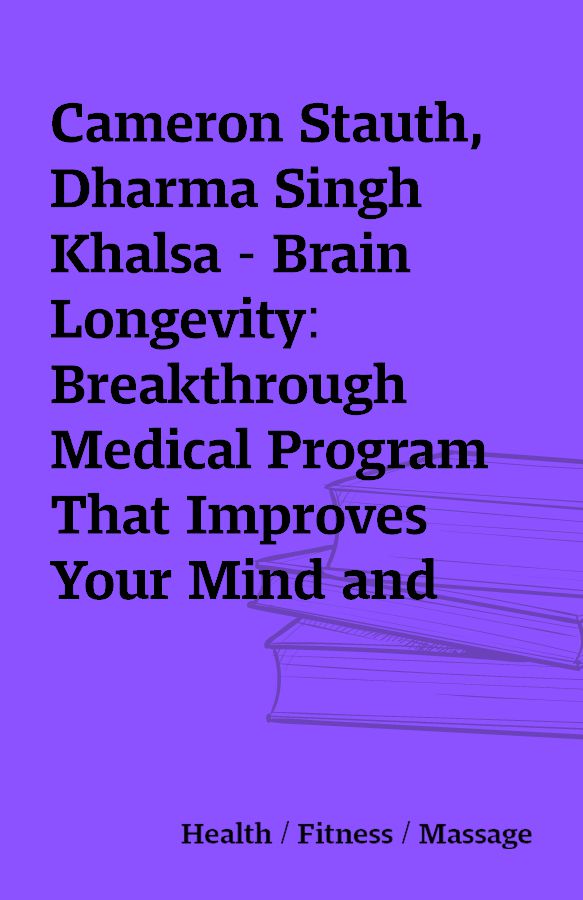
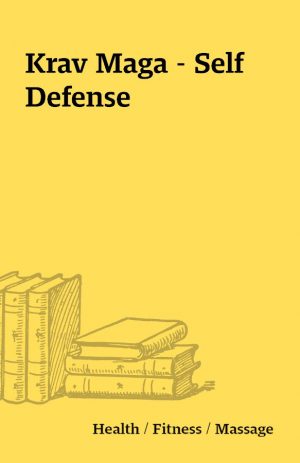
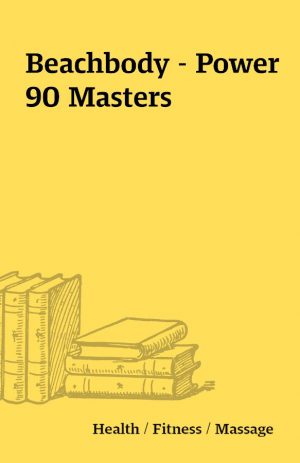
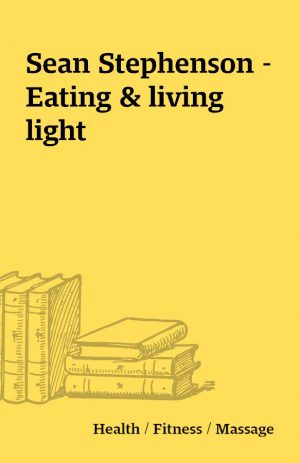
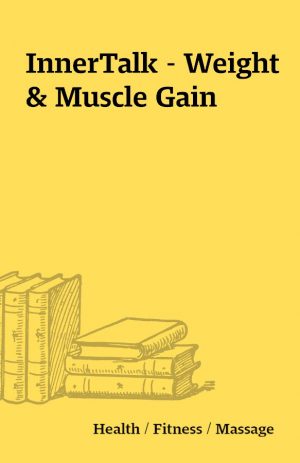
Reviews
There are no reviews yet.